#Transmutation allegories
Text
"Unlocking the Esoteric Tapestry: A Journey Through 'The Alchemical Writings of Edward Kelly'"

"The Alchemical Writings of Edward Kelly" invites readers into the mystical realm of alchemy through the eyes and pen of the enigmatic Edward Kelly, a figure deeply intertwined with the alchemical pursuits of the Renaissance. This collection, skillfully compiled and annotated, unveils the arcane wisdom and esoteric insights of a man whose contributions to the Hermetic arts have long been shrouded in mystery.
Kelly's writings, presented with meticulous attention to historical context, offer a profound glimpse into the spiritual and transformative aspects of alchemy. The editor's annotations guide readers through the labyrinth of alchemical symbolism, providing clarity without diminishing the mystique. From the famed Enochian system to the allegorical language of transmutation, Kelly's words resonate with seekers of hidden truths.
The anthology captures Kelly's alchemical opus, showcasing the intricacies of his experiments, the symbolism embedded in his writings, and the quest for spiritual enlightenment. It serves as a key to decoding the cryptic language of alchemy, making it accessible to both seasoned practitioners and curious minds.
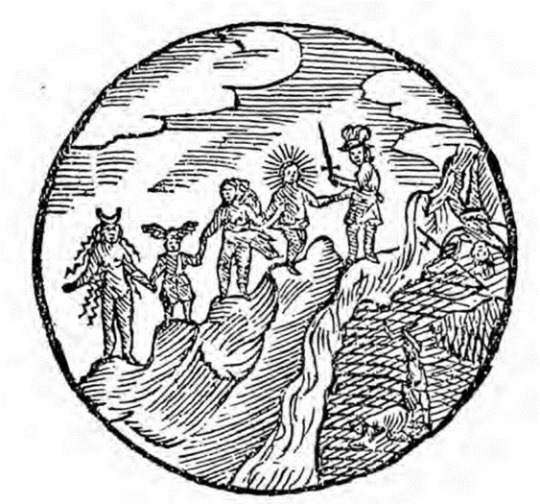
(The illustration presented in the book: a black rock, on which stand, hand in hand, the planets: 1, Black Saturn, falling down; 2, Jupiter; 3, Mars; 4, Mercury of many colours; 5, Venus, with green robe, and the Sun and Moon. Lower down, on the black rock, stands an old man with a pick-axe, cutting a piece out of the rock, whence Saturn falls, and near him lie, as if dead, Jupiter and Saturn.)
As the pages unfold, readers are immersed in the alchemical laboratory of Kelly's mind. The author's profound understanding of the mystical journey, coupled with his ability to articulate complex concepts, makes this collection a valuable resource for those exploring the intersections of spirituality, philosophy, and the arcane sciences.
In conclusion, "The Alchemical Writings of Edward Kelly" is a captivating odyssey into the depths of alchemical thought. Whether you are a seasoned alchemist or a curious soul embarking on the quest for inner transformation, this anthology is a beacon of enlightenment. Prepare to be entranced by Kelly's alchemical tapestry—a rich weave of symbols, insights, and secrets that beckon the daring to unlock the mysteries of the alchemical tradition.
"The Alchemical Writings of Edward Kelly" is available in Amazon in paperback 12.99$ and hardcover 18.99$ editions.
Number of pages: 143
Language: English
Rating: 10/10
Link of the book!
Review By: King's Cat
#Edward Kelly#Alchemical writings#Hermetic wisdom#Enochian system#Renaissance alchemy#Mystical transformation#Esoteric symbolism#Spiritual enlightenment#Alchemical experiments#Transmutation allegories#Hidden truths#Cryptic language#Alchemical opus#Inner transformation#Arcane sciences#Alchemical philosophy#Spiritual journey#Elixir of life#Occult symbolism#Mystic insights
1 note
·
View note
Text
"Unlocking the Esoteric Tapestry: A Journey Through 'The Alchemical Writings of Edward Kelly'"
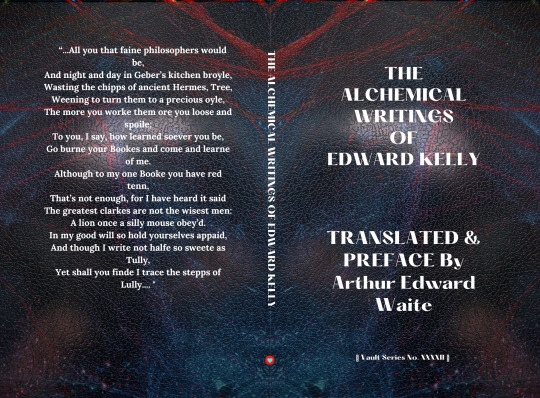
"The Alchemical Writings of Edward Kelly" invites readers into the mystical realm of alchemy through the eyes and pen of the enigmatic Edward Kelly, a figure deeply intertwined with the alchemical pursuits of the Renaissance. This collection, skillfully compiled and annotated, unveils the arcane wisdom and esoteric insights of a man whose contributions to the Hermetic arts have long been shrouded in mystery.
Kelly's writings, presented with meticulous attention to historical context, offer a profound glimpse into the spiritual and transformative aspects of alchemy. The editor's annotations guide readers through the labyrinth of alchemical symbolism, providing clarity without diminishing the mystique. From the famed Enochian system to the allegorical language of transmutation, Kelly's words resonate with seekers of hidden truths.
The anthology captures Kelly's alchemical opus, showcasing the intricacies of his experiments, the symbolism embedded in his writings, and the quest for spiritual enlightenment. It serves as a key to decoding the cryptic language of alchemy, making it accessible to both seasoned practitioners and curious minds.

(The illustration presented in the book: a black rock, on which stand, hand in hand, the planets: 1, Black Saturn, falling down; 2, Jupiter; 3, Mars; 4, Mercury of many colours; 5, Venus, with green robe, and the Sun and Moon. Lower down, on the black rock, stands an old man with a pick-axe, cutting a piece out of the rock, whence Saturn falls, and near him lie, as if dead, Jupiter and Saturn.)
As the pages unfold, readers are immersed in the alchemical laboratory of Kelly's mind. The author's profound understanding of the mystical journey, coupled with his ability to articulate complex concepts, makes this collection a valuable resource for those exploring the intersections of spirituality, philosophy, and the arcane sciences.
In conclusion, "The Alchemical Writings of Edward Kelly" is a captivating odyssey into the depths of alchemical thought. Whether you are a seasoned alchemist or a curious soul embarking on the quest for inner transformation, this anthology is a beacon of enlightenment. Prepare to be entranced by Kelly's alchemical tapestry—a rich weave of symbols, insights, and secrets that beckon the daring to unlock the mysteries of the alchemical tradition.
"The Alchemical Writings of Edward Kelly" is available in Amazon in paperback 12.99$ and hardcover 18.99$ editions.
Number of pages: 143
Language: English
Rating: 10/10
Link of the book!
Review By: King's Cat
#Edward Kelly#Alchemical writings#Hermetic wisdom#Enochian system#Renaissance alchemy#Mystical transformation#Esoteric symbolism#Spiritual enlightenment#Alchemical experiments#Transmutation allegories#Hidden truths#Cryptic language#Alchemical opus#Inner transformation#Arcane sciences#Alchemical philosophy#Spiritual journey#Elixir of life#Occult symbolism#Mystic insights
1 note
·
View note
Text
This unique character in a scifi has a transfigured and uncanny appearence and the story hinges on the tradegy that unfolds when only two people on opposite sides of a conflict can actually treat it with any kindness and respect.
But well.... we decided that was kinda ableist cause the ables were being meannnnn and the character is UGLY and CHILDLIKE so instead when we revisted it we made HER pretty and she had just like scifi autism [which ONLY presents socially it would NEVER effect someones appearence or GAIT]
You understand im killing you with knives yes?
#some shit#its not called cisformers#why is..... every tf comics thing i learn about like. welllll we thought it was bad rep so we did [something worse]#okay. this isnt techincally 'worse'in the same way the gender one is. which. is just categorically worse.#but like. you understand that THATS. not the. like okay it dies its a sad story.#an episode from the fucking. late nineties that probably wasnt even TRYING to be. disablity allegory. like.#BUT OKAY. u WANT to make it disability allegory. AND YET U ARE AFRAID. OF THE KIND OF DISABILITY. THIS CHARACTER COULD BE ALLEGORED TO HAVE#im KILLING YOU. WITH KNIVES.#the character is also my beloved transmutate so U_U. kill.
16 notes
·
View notes
Text
Transmutation is so beautiful
4 notes
·
View notes
Text
The River’s Shimmer
I chase the sun the way a dragonfly crosses traffic.
In systems that are tyrannic,
righteousness is deemed erratic and manic.
But bees greet me every day,
urging me to stay busy in life’s ballet.
From the divine’s anther to the earthling’s stigma, I transfer pollen.
No matter how illusive societal bars are,
imagination will not be stolen when my vision is swollen.
The spell that is spoken can unwrite a curse that must be broken!
In due time, we will be fertilized;
Both psyche and soul will be baptized.
Until then, may every Merkabah be a precious spaceship
May we seek to remember our cosmic fellowship
and intention for earthly stewardship.
#negressofsaturn#spirituality#zisa aziza#poetry#evolution#writers and poets#nyc poets#metaphysics#allegory#Transmutation
1 note
·
View note
Text
someone else has to have said this but. lot of potential in alchemy as trans allegory or vice versa
something something "god made ppl trans for the same reason he made grapes but not wine" etc. ~ alchemy is about accelerating or replicating natural processes or doing what nature couldn't or didn't get around to
transformation of self ~ transmutation of metals
the church hates you
the government sometimes hates you and sometimes wants to use you for their own image or gain
associated w cool art and philosophy
chemicals can be involved
#was thinking about this yesterday i don't have any more coherent things to say than i did then i just think it's neat#alchemy#trans
20 notes
·
View notes
Text

The word temperance in the dictionary literally means “moderation or self-restraint in eating and drinking, mostly in reference to alcohol,” but if you look at the original etymology, there is something more profound. The word temperament relates to temperance, one's character, one's virtues, one's psychological qualities. The word temperance comes from the Latin temperantia, “moderation,” as well as temperare, “restraint.” You also get words like temperature, heat, from temperance. But in what sense in relation to the 14th Arcanum?
When a blacksmith makes a sword, he tempers the steel in great adversity, great heat, great fire, and afterward, places it, the metal, within water, in a cool element, exposing the metal to heat and cold―two extremes―in order to find that perfect balance of a weapon that is very sharp and deadly. It is an allegory of the soul, how our consciousness must learn to face extremes, but with temperance, with balance, because in life, we are consistently exposed to great ordeals, great extremities, in which we feel the fire of criticism or the cold of solitude. But in order for us to be well formed as a soul, we must learn to go through both extremes, but without identifying with the mind.
We have to face the ordeals of fire, the ordeals of water, the ordeals of earth, and the ordeals of air, which are all allegorized by the blacksmith Vulcan, forging the sword of the soul and the armor for the great heroes, the great alchemists.
#tarot ritual#tarotreading#tarotcards#tarot readings#free tarot#daily tarot#tarot deck#tarot reading#tarot cards#tarot#tarotblr#tarotcommunity#chicago gnosis#gnostic academy of chicago#chicago gnosis podcast#spirituality#gnosticism#gnosis#samael aun weor#samaelaunweor#samael#kabbalah#gnostic tradition#gnostic kabbalah#alchemy#awakening#meditation#consciousness#gnostic#spiritual
17 notes
·
View notes
Text
"Praying to the Jesus allegory in this game lets you learn the skills walk on water and transmute (water into wine)"
Oh haha, that's funny.
"He also lets you set up a fast travel network and teleport"
...I'm sorry?
48 notes
·
View notes
Note
Hi! Do any of you have tips for writing good stories? Thanks!
//That's...a pretty broad question, but here's some advice I've taken to heart, presented in no particular order. Hope it helps!
Characters should primarily be your focus, especially their development. They shouldn't feel like devices to move the plot forward, but naturally push the plot where you want it to go through their choices.
Remove superfluous elements. I find stories work best when all of their elements contribute in some capacity; if there are aspects of a story that don't go anywhere or have no bearing on the plot at large, consider cutting them.
Subtlety is overrated when it comes to messages people need to hear. Tolkien was right when he said allegory is for cowards. If you wanna write about something that may ruffle some feathers, don't use a fictional stand-in to talk about it, just talk about it.
A story doesn't need to be grimdark, mature or even realistic for it to be good. It just needs to tell a compelling story with interesting characters.
Characters don't necessarily have to be good people, but they have to be interesting. Don't rely on overused archetypes in writing, and while it's cool to want to have an expy of a character you like, see if you can instead draw some inspiration from the real world instead.
Don't be afraid to have characters make mistakes or bad decisions, but make sure those decisions are ones they would make as characters. The audience should never feel like decisions are made just because the writer wants them to.
Different people are going to like and dislike different things about your story. Don't write for them, write the kind of story you want to see.
Do your research. Do your research. Do your research.
If there's something in your work that you or your readers come to dislike for whatever reason, don't simply retcon it away. See if you can find ways to make existing and potential problems in your writing a new source of story, drama or character development.
It's impossible to avoid cliches completely. The best you can do is breathe new life into them and see if you can approach them from new angles.
Think through the implications of your worldbuilding before you write into the story, to see if any new idea will completely change the impact or internal logic of the story. If the technology for Faster-Than-Light travel exists, does it have any other impact besides getting people around the galaxy? If there's magic to transmute rocks into gold, why hasn't the gold industry collapsed if anyone can do it?
Fridging is a bad, bad trope.
Characters should be able to stand on their own, and shouldn't be solely defined by their relationships with others. Shipping can be fun, but don't let it completely overtake who your characters are as people.
Redemption arcs are great...when you actually give them an arc and don't just have everyone forgive them 5 episodes after nuking an orphanage.
Morality in a story will depend largely on the sort of theme you're going for, but also on the kind of world you've constructed. A post-apocalyptic wasteland where people are struggling to survive is probably going to have less emphasis on "killing is immoral" than a magical setting where there's an actual God of Justice who takes that rule seriously.
Nobody in a story should be above any sort of consequences for their actions. It can be delayed, it can be mitigated, but never ignored.
Throwing dark, upsetting and potentially triggering material into a story simply for the sake of drama, to be shocking or to convince readers the story is "mature" does exactly the opposite; it's incredibly juvenile and terrible.
Less is more. We don't need to see every detail of a character's daily routine to get a sense of what things are like for them, and we don't need a full description of everything that happens. Sometimes just a single sentence or even a word can be far more effective.
The term "Mary Sue" has, over time, become a pejorative people use when to describe characters they don't like, especially those who are too powerful or have few flaws in their eyes. The real term refers to characters who are functionally the center of their universe; nothing happens that doesn't involve them and they're treated as the most important person of all time. If you don't do that, your character is not a Mary Sue. Still worth considering how you write them, however.
If you're going to write about characters of a particular group and you're not a member of that group (Black, Jewish, American Indian, LGBTQ, Neurodivergent, etc.), do not be afraid to ask questions and get some insight. Also, writing about these characters not equate to needing to focus on bigotry and oppression; if you do, those issues also should not overtake them as characters. They need an identity outside of that.
//Hope all that helps!
29 notes
·
View notes
Text

Alchemy is both a physical and spiritual science, according to the Philosophers, the physical is a "shadow" of the spiritual. Physical Alchemy is considered to be a true science and a paragon which leads to the true Light of Nature. Here Mr.Kuhn sheds some light on the spiritual allegory as it relates to ancient Scriptures.....his work is highly recommended for a return to the understanding of the cryptic meaning of Ancient myths and texts:
"Armed with this unquenchable fire which is intellect, we are sent on earth to inhabit a body which is described as a watery and miry swamp. The body is nearly eighty percent water! It is the duty of the fiery spark to enlighten the whole dark realm of mortal life, to transmute by its alchemical power the baser dross of animal propensity into the finer motivation of love and brotherhood. This life is a purgation--Purgatory--because it is a process of burning and tempering crude animal elements into the pure gold of spiritual light. In Egyptian scriptures the twelve sons of Ra (the twelve sons of Jacob, and the twelve tribes of Israel) were called the 'twelve saviors of the treasure of light.' An Egyptian text reads: 'This is the sun within us, the seminal source of light. Do not dim its luster or cause it to suffer eclipse.' And another runs: 'Give ye glory as to the sun; he is the chief, the only one coming from the body, the head of those who belong to the race of the sun.'
With this force of fire we must uplift the lower man and transmute his nature into the spiritual glow of love and intelligence. With it we must turn the water of the lower nature into the wine of spiritual force. Around it we must aggregate the refined material which we shall build into that temple of the soul, that body of the resurrection, the great garment of solar light, in which we shall rise out of the tomb of the physical corpus and ascend with the angels. This is the radiant Augoeides of the Greeks, the Sahu of the Egyptians, in which the soul wings its flight aloft like the phoenix, after rending the veil of the temple of the body. It is our garment of immortality, the seamless robe of glory, in prospect of which we groan and travail, says St. Paul, as we earnestly desire to be clothed upon with the garment of incorruption. As flesh and blood can not inherit the kingdom of heaven, we must fashion for our tenancy there this body of solar glory, in whose self-generated light we may live eternally, having overcome the realms of darkness, or spiritualized the body. Jesus prays the Father to grant unto him that glory that he had with him before the world was, and his prayer is fulfilled in the formation of the spirit body out of the elements of the sun."
-Alvin Boyd Kuhn
3 notes
·
View notes
Text
Great Star Trek Rewatch - The Original Series S2
Originally posted on Twitter 26 October 2020 - 2 December 2020
Star Trek: The Original Series Season 2 is up next in my Great Star Trek Rewatch. As with ENT, DSC, STX, and TOS Season 1, mini-reviews will document my progress.
Amok Time: After 29 episodes and some contradictory continuity, we finally get the first concrete details on Mr. Spock and the Vulcan species. A classic fight scene rounds out a strong start to Season 2. 8/10
Who Mourns for Adonais?: A decent early Season 2 entry. The giant green space hand is iconic, but the meat of the story rises above. Thanks to this episode, it became tradition that chief engineers on the starships Enterprise can't catch a break in the romance department. 7/10
The Changeling: A dry run of sorts for the superior Star Trek: The Motion Picture. The second time Kirk talks a computer to death, and it's a slow burn to the climax. 6/10
Mirror, Mirror: One of the most enduring concepts across Trek's 50+ year history is the Mirror Universe. This is still one of the best Mirror Universe tales, simply for its originality and focus. 9/10
The Apple: A Prime Directive debate and some red shirt massacres forms the crux of this otherwise forgettable episode. Definitely not one I'd revist on a whim. Not terrible, just mediocre. 5/10
The Doomsday Machine: This one and "Balance of Terror" jockey back and forth for #1 on my list of the best TOS episodes. William Windom's performance is superb, the titular device is scary (I hid behind the sofa when I watched this one as a kid), and the score is iconic. 10/10
Catspaw: Star Trek and Halloween don't go very well together. Even though this has an ostensibly scientific explanation, it still reeks of magic and sorcery. It is goofy, that's why it gets 4/10.
I, Mudd: This one starts slow but turns into a classic comedy by the end. Carmel is back as Mudd, though the portrayal of his wife is problematic at best. 7/10
Metamorphosis: This poignant love story with a solid sci-fi hook just clicks for me. It’s not the best but it just works. 9/10
Journey to Babel: Season 2 is definitely Spock-focused, and those episodes have not disappointed. This is a classic for good reason: action, pathos, humor, world-building. 10/10
Friday’s Child: Tonal problems keep this one from joining the ranks of the true classics. It’s serviceable but dreadfully slow in the middle. The Capellans are a fascinating race, it’s too bad we don’t see them again. 6/10
The Deadly Years: Impressive 60s aging makeup aside, this one doesn’t do much for me. The old age jokes are stereotypes, though the use of elderly actors in the first act is ingenious. And a rare bit of serialization with a callback to “The Corbomjte Maneuver” is welcome. 6/10
Obsession: Kirk gets some backstory and dimension in a tight, tense script. This is a well-paced acting showcase for Shatner. 9/10
Wolf in the Fold: This would have made for an excellent Halloween episode. A gaseous/energy being is easier to believe than the “Catspaw” transmuter, oddly enough. The line about women being easier to scare, and the Kara dance, are typical ugly 60s sexism, unfortunately. 7/10
The Trouble with Tribbles: A fuzzy thing happens on the way to Sherman’s Planet. A classic that thoroughly earns the title, it’s endlessly rewatchable and filled to the brim with classic gags, one-liners, and scenes for the entire cast. 10/10
The Gamesters of Triskelion: Angelique Pettyjohn’s look is iconic, but not much else about this episode is. A huge letdown after the preceding episode. 5/10
A Piece of the Action: An excellent palate cleanser after the preceding dud. Really wish we could follow up on the Iotians some day. I forgot how funny this episode is. 9/10
The Immunity Syndrome: Season 2 giveth, and Season 2 taketh away. The concept of a spaceborne lifeform is compelling, but this is otherwise a dog of a show. 4/10
A Private Little War: when the show tackles the Vietnam allegory, it sings. When it focuses on Nona, it falters under the weight of 60s’ sexism and bigotry. 7/10
Return to Tomorrow: A different take on the non-corporeal beings trope that hangs around TOS like an albatross, this one is more nuanced and subtle than most. Come for Nimoy’s delightful villain performance, stay for the poignant denouement. 8/10
Patterns of Force: An examination of how easy it is for a society to fall in love with fascism misses the mark by claiming power and not racism was the animus of Nazism, much like Confederate apologists claim the Civil War was about rights and not slavery. 0/10
By Any Other Name: The Kelvans’ powers are frightening, but it’s an episode I just can’t get excited about, except for Scotty drinking one under the table. 6/10
The Omega Glory: Gene, your über-patriotism is showing. Another late Season 2 letdown. 3/10
The Ultimate Computer: TOS has a serious distrust of powerful computers/AI that fades somewhat in the later series. Daystrom is a tragic figure, and the horror of the murder of the Excalibur’s crew is effectively conveyed. 8/10
Bread and Circuses: The social commentary is on point, but two parallel Earth stories in three weeks is somewhat tiresome. Still, an entertaining yarn. 7/10
Assignment: Earth: I’m ambivalent on this back door pilot. I like the Gary Seven character, and I normally enjoy time travel stories, but it just doesn’t do a whole lot for me. It’s not excellent, it’s not bad, it just is. 6/10
And with that, Season 2 of TOS comes to an end in my Great Star Trek Rewatch. Final score: 6.77/10. Highest score(s): "The Doomsday Machine," "Journey to Babel," "The Trouble with Tribbles." Lowest score(s): "Patterns of Force"
10 notes
·
View notes
Text
Problem Sleuth, page 937
Next.
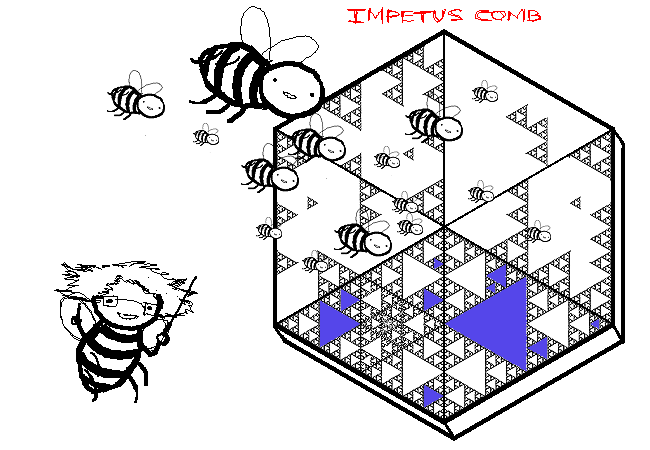
They busily set to work building an IMPETUS COMB to transmute the bitter nectar into sweet JOCOSE HONEY. Recently collected nectar is stored between the walls of the newly erected SIERPINSKI CELLS.
They labor under the instruction of their CHIEF ARCHITECT.
Author commentary: I don't know what kind of combat IDIOT shows up to a battle without packing his impetus comb. But Team Sleuth is of course the model of sound martial judgement. You would think that by definition a comb made of Sierpinski triangles would never be able to be finished, due to its infinitely small recursive nature? But somehow the bees manage anyway. The impetus comb is actually an allegory for MS Paint Adventures. I am the bees, and it, my intractable comb.
4 notes
·
View notes
Text
some stories are just absolutely incompatible with modern au-ification because the characters are sooo circumstantially defined. id count black sails in this group and also left hand of darkness. you get the vibe. the characters are so specific to the setting and events that they cannot exist without it*. i feel like that specificity is actually key to the story’s quality, the fact that they MUST happen when/where they happen. and yet to be clear that doesn’t mean the stories are less applicable to modern life. in fact id say it’s the opposite — the unfamiliarity and specificity make for *more* engaging allegories than something that could just 1:1 translate into the real world
and yet, tragically, many of these stories are the ones people are most compelled to make modern AUs of. I suppose I can understand it as a way of digesting the story and thinking through its applications. but you lose something in simplifying and streamlining the allegory — there’s a reason it’s presented the way it was. if the author just wanted to communicate the story’s ideas to you outright, they’d publish a manifesto, not a fictional work
id say this is different for fanart — representing the characters visually in a different setting is more fruitful because it doesn’t try to reproduce or ignore the original work’s themes, just suggests an alternate angle on them. this point isn’t fully developed in my mind though
*although black sails could of course be transmuted into a sci fi spacefaring far-future. this should be taken as a given with all pirate stories and it does not impact my premise whatsoever
#also Xena is a show that is good that would totally be fine w modern aus#so I’m not just being a hater I’m trying to hit on something#the frog speaks
2 notes
·
View notes
Text
I just watched an old episode of transformers from the 1990s Beast Wars series. It's called transmutate. It's the most ableist thing I have ever seen.
the central character of the episode, also named transmutate, has the transformers equivalent of down syndrome or some other kind of birth defect, and as a result is physically and mentally disabled. They're all so stupidly powerful, to the point of being able to incapacitate everyone around them by screaming. Which is cool, and I wish that all people with birth defects in real life could do that. Their voice is also modulated in such a way as to mimic devices like the one Stephen Hawking uses, which are common tool for disabled people who can't speak on their own.
they have no agency in the narrative whatsoever. They don't get to actively make any decisions except to not kill silverbolt. They spend the entire episode being manipulated by rampage, who is the survivor of some really traumatic surgery and a kind of Hannibal lecter type person, or in the custody of the maximals, the good guy faction. They spend the entire episode getting no say in what they are doing, with every character present using it to refer to them. The maximals literally want to euthanize them because they think transmutate is dangerous to other people as a result of the screaming and mental disability. Transmutate is standing right behind them when they decide this, and gets no say in the matter whatsoever. They don't get to speak up for themselves, they have to wait for someone else to do it for them. This is a pattern throughout the episode: every decision they make is in fact made by someone else, without any of their input. The show's resident doctor makes an official diagnosis that they are "barely smarter than a drone". They're presented with an intellect that is meant to be compared to a very young child, and they can't speak full sentences. Even the one character advocating in their favor, silverbolt, doesn't ask them for input on any decisions he makes about them. And he's portrayed as only advocating for transmutate to have the right to be alive because silver bullet is portrayed as a stupidly Noble person, to the point of refusing to fight unarmed enemies in war. Every other maximal, who are supposed to be the good guy faction, decides killing transmutate is a better solution than allowing transmutate to stay alive.
transmutate dies at the end of the episode, stopping missile volleys that would have killed silverbolt and rampage. This is the only decision they make in the entire episode, and they do it on purpose. Apparently the only fate disabled people should ever aspire to is self-sacrifice to save abled people who could have easily survived injuries they would have sustained otherwise.
this entire episode serves solely as an allegory for the question of "should we euthanize disabled people without their consent?", Which I thought was pretty fucking settled by the 1990s but apparently not, and then it kills said disabled character to make everyone feel sad.
Again this is the most ableist thing I have ever seen, and if transmutate didn't show up in other transformers media as an actually respectful depiction of autism, I would kill someone. Thankfully she does, but this is still absolutely terrible and I have no idea how this ever got aired. Fucking hell.
here's a link to the episode on YouTube: https://youtube.com/watch?v=_diuldST6wk
17 notes
·
View notes
Text

The grail cup is the symbol of the creative force of nature; it is also the symbol of the human race which is slowly learning the mysteries of creation. Within the cup is the blood of Christ, that force which is transmuting the body into soul, fast or slowly as we give it greater or lesser opportunity. In the sacred spear we find symbolized again the creative force, which in the hands of Klingsor, the evil one, wounds and causes suffering, but which when held by the pure Parsifal heals the very wound that it caused.
A great lesson is being taught to man through these allegories, but the average person is unwilling to stop and consider them. They do not realize that they themselves are the ones whom the Elder Brothers of humanity must use in the fight against the forces of evil. They do not realize that the dragons and ogres of the legends are their own lower natures which they must overcome.
They do not see in the hand to hand combat of the knights of old for a lady’s hand the higher and lower man fighting for the soul within. The knight of today does not realize that the white armor that he wears is his own purified body which is proof against all the attacks of vice and passion, but nevertheless this is the meaning of the legend.
His shield is truth, which is a perfect protection to the inner man. His strong right arm is the knowledge and spiritual power he has developed within, and the sword that he uses is the spiritual light with which the pure flame of the spirit fire dispels the darkness of ignorance and the demons of lust. The sacred spear and the cup which he serves are the two poles of the creative life force within, the development of which he gains as he daily serves his fellow men.
Far from the uninitiated the twelve Elder Brothers of mankind sitting around the circular table of the universe watch the knights in their battle of life, and the time comes when the student having finished his work here is liberated at the foot of the Grail.
There the candidate stands robed from head to foot in the armor of spirit and in the pure white of a body that has been cleansed. Then the cloth is lifted from the sacred cup, and he is illuminated by the light which would have killed him had he seen it without purification. He then takes his place among the knights of the Round Table, and joins those who give up all and labor for humanity.
Initiate of the Flame - MPH
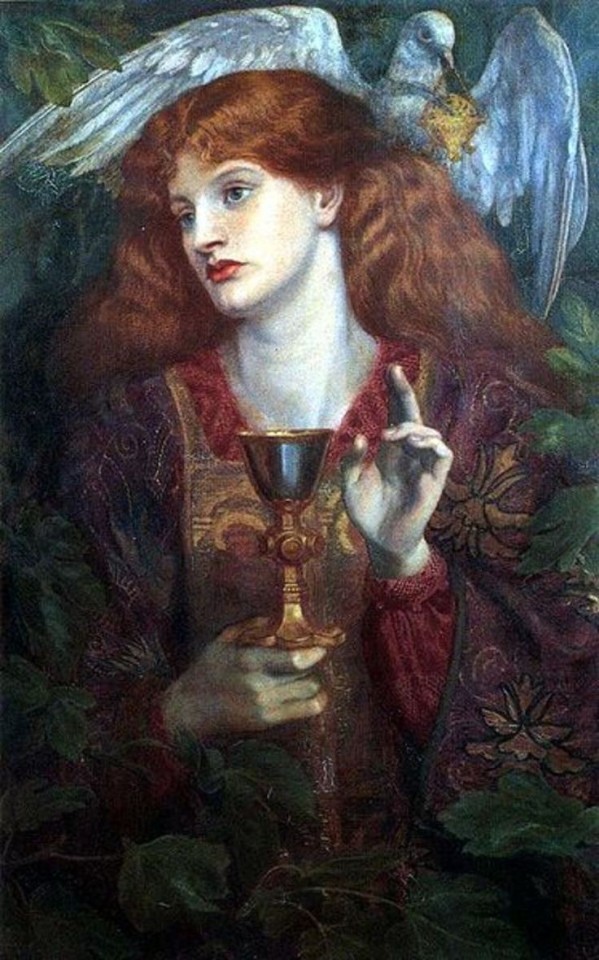
Lady of the Grail - Dante Gabriel Rosseti
#initiation#holy grail#manly p hall#dante gabriel rossetti#parsifal#higher self#lower self#occultism#mysticism#hermetic philosophy#esoteric#know thyself#ai artwork#aiartcommunity#ai
6 notes
·
View notes
Photo
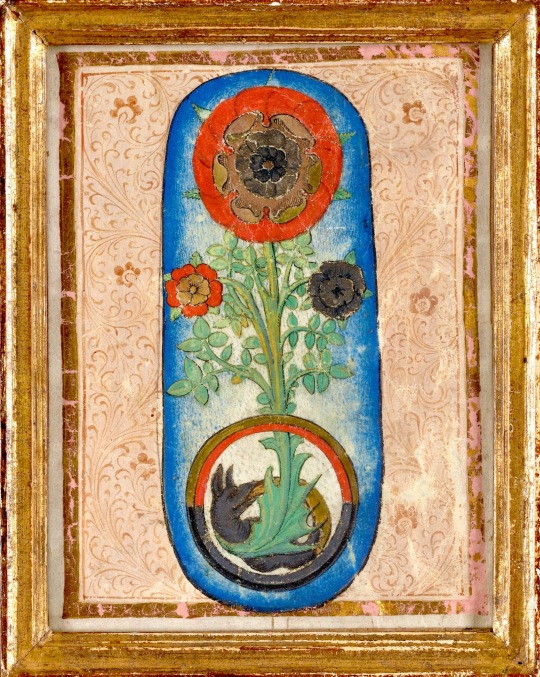
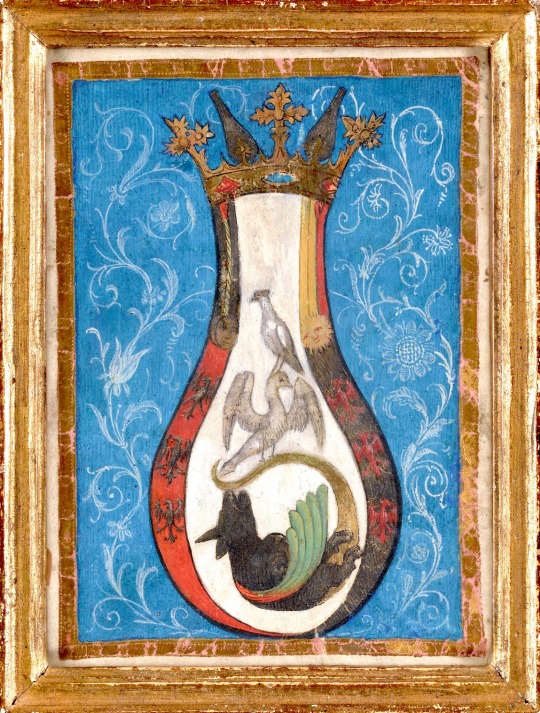
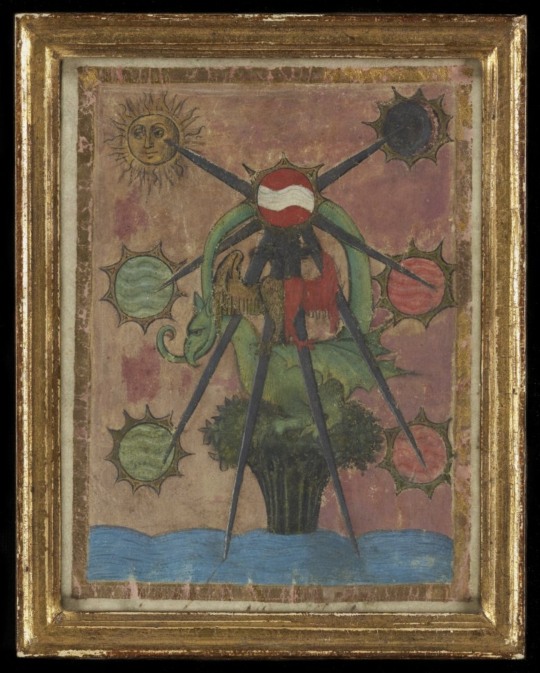
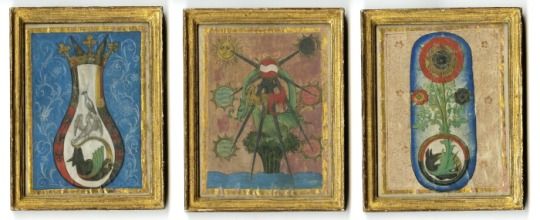
~ “Allegory of Purification Alchemical miniature believed to be from Das Buch der heiligen Dreifaltigkeit (The Book of the Holy Trinity), based on the iconography depicted and their relation to the text. c. 1450 – 1475; The Seven Forms of Transmutation, from Das Buch der heiligen Dreifaltigkeit (The Book of the Holy Trinity); The Flower of Wisdomfrom Das Buch der heiligen Dreifaltigkeit (The Book of the Holy Trinity).” ~
https://www.textmanuscripts.com/enlu-assets/catalogues/primer/primer-2-alchemy/primer-2-alchemy.pdf?fbclid=IwAR2g-tLI6OO4-ux5iyLFo-wR_ffOzg35IsIaEd1J9Z_TnSYRVwgUtnjMSMI.
https://cen.acs.org/articles/92/i2/Scholars-Land-Alchemy-Cache.html?fbclid=IwAR26GBvaCKcuCVaC902nHs-aVVXvZNnqhvgq5Tgw3c4p8QsuTm6BdJaMVUw.
2 notes
·
View notes